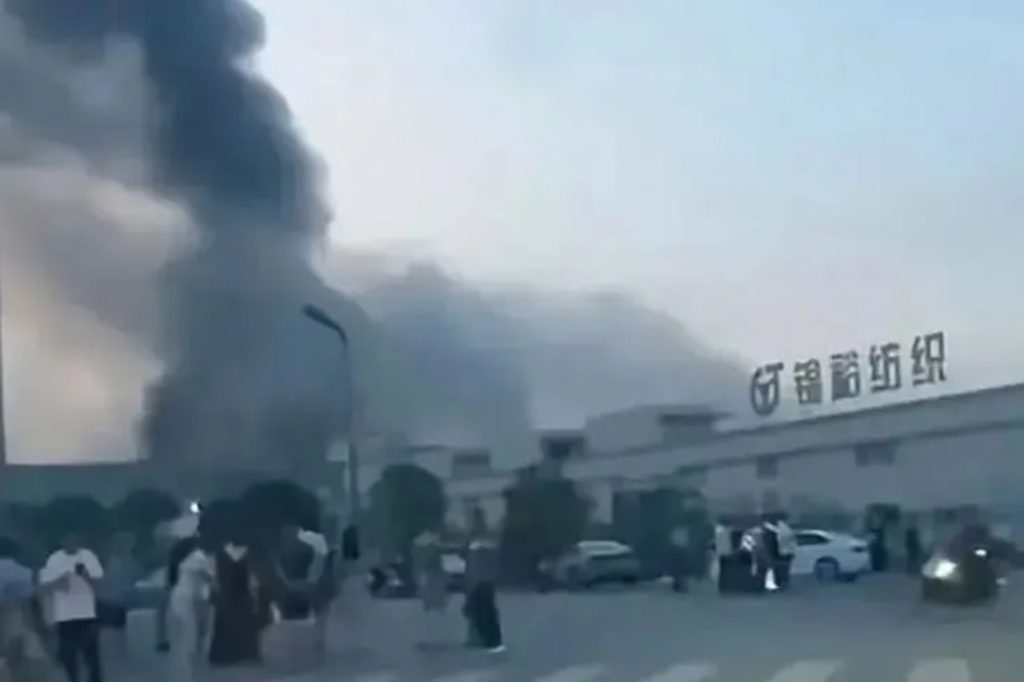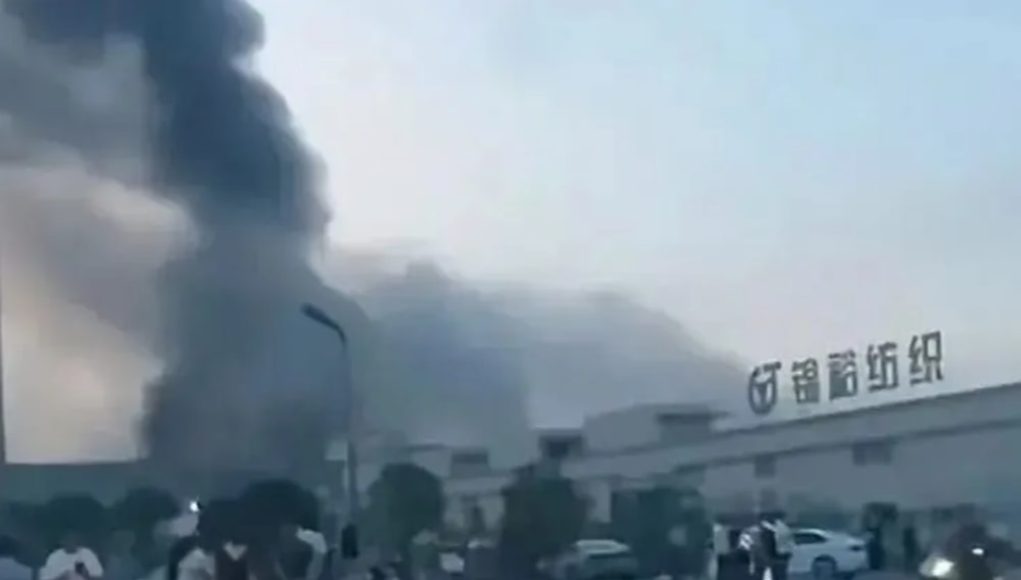(27.5.2025 – Singapore) After a blaze razed a textile factory in China’s Yibin City in Sichuan province, China, online claims that a “former employee has started the fire after failing to get his pay of 800 yuan (S$152)” spread wildly across Chinese social media. The suspect’s act unexpectedly attracted significant public sympathy, with some even respectfully calling him “Brother 800.”
The incident has sparked fear that unjustified retention of wages has become a common issue in China, and authorities worry that the case might prompt similarly aggrieved people, especially impetuous youths, to commit similar retaliations across the country, the Chinese media reported.
The fire took place last Tuesday (May 20) at Sichuan Jinyu Textile Co., Ltd., located in Pingshan County, Yibin. According to Chinese media outlet Huashang Daily, the blaze lasted from noon till evening, with thick smoke billowing into the air.

Unsubstantiated claims appeared online soon after the fire that a worker at the factory had been owed a month’s wage. It was said he went to confront the handler of his pay and a fight broke out, during which he stabbed the latter with a knife. After that, he poured gasoline on the surrounding fabrics and burnt down the factory.
On Thursday, Pingshan’s Public Security Bureau confirmed that a 27-year-old man surnamed Wen went to the textile factory on Tuesday and started the fire. He was subsequently arrested by police at the scene.
According to the bureau, the huge stacks of cotton in the factory made it difficult to put down the fire. After arduous effort, the fire was brought under control, and no casualties were reported. Wen is placed under criminal detention, and investigations are ongoing.
Meanwhile, across major Chinese social media platforms, word about Wen having started the fire after being withheld 800 yuan in wage continued to circulate. This account led to widespread sympathy for him. He was even dubbed “Brother 800,” “Master Eight,” and “Uncle Eight” by netizens.
Many online commenters called Wen a “people’s hero,” arguing that grassroots workers are long oppressed and exploited, with few avenues to defend their rights. They said “Brother 800” had ignited the rage of the working class — “burning himself to enlighten others” — and believed the fire served as a lesson for factory owners across the country. Some proposed donating money to Wen’s family or raising funds to hire a lawyer for him. Wen’s father is said to be bedridden and his mother ill too while his sister is still in school.
However, there were also condemnations. Some netizens pointed out that Wen’s action destroyed the livelihoods of other workers of the factory: “This revenge against society is a cancer,” wrote one. “He is despicable and should be severely punished!” These critical voices were quickly attacked by others, being accused of being “traitors to workers” or “shills for capitalists”, Singapore’s Lianhe Zaobao reported.
In response to the massive sympathy for Wen, Pingshan police released a second statement on Friday clarifying that the online claim of “800 yuan in withheld wage” was untrue. They urged the people not to believe or spread rumours.
According to this later statement, Wen had been a pessimistic and withdrawn person since childhood and had dropped out of school. He then followed his parents to work in different places or worked on his own. He returned to his hometown in Yibin for the Chinese New Year this year.
On March 1, Wen was introduced to the textile factory and began working as a manual labourer. His employment contract specified a three-month probation, with wage to be paid on the 25th of each month.
The statement added that Wen resigned on April 30. On May 15, he completed the resignation procedures and worked out his remaining wage to be 5,370 yuan. He requested immediate payment. The finance staff agreed to pay him but only after going through the approval process. Back home that day, Wen contacted his supervisor again for the payment but the issue remained pending. He then vented his anger through the fire.
According to the police statement, Wen has confessed that suicidal thoughts drove him to resign and he wanted to give his wage to his mother before ending his life.
On Friday, Yibin police also announced punishments for three persons for spreading misinformation about the case: a man was detained for six days for posting videos claiming “a murder and arson were triggered by unpaid 800 yuan wage”; a woman was fined 300 yuan for posting similar claims; and another man received a reprimand for posting that “an employee set fire to the factory after being beaten when trying to collect unpaid wage.”
Despite the police clarifications, many netizens expressed even deeper empathy for Wen. Some sarcastically remarked: “Now, ‘not being paid after multiple requests’ is reduced to just ‘a wish not being fulfilled’?” and “So the issue isn’t 800 yuan, but over 5,000!”
On Saturday, Fangyou.com, a platform of China National Machinery Industry Corporation, published an article noting that the arsonist in this case is only 27 years old. It pointed out that the core labour force in China’s textile industry now comprises those born after 1990, who would demand greater equality and respect at work. Persisting with “parental-style” management can incur long-lasting resentment.
The article also criticized outdated labour conditions in textile factories, including 12-hour rotating shifts and denial of proper holidays, which erode the industry’s appeal to young workers. It argued that the hiring challenges have led to the reckless employment of individuals with potential psychological issues.
The article also noted that China’s textile industry is currently under pressure due to weak foreign trade and domestic demand, with inventories high and cash flow tight. In Sichuan, where the incident occurred, many textile companies are struggling with shrinking orders and weak finances.
America’s Wall Street Journal reported in November last year that wage arrears are a growing problem in China. While labour disputes are not uncommon, vicious cases like this are increasingly visible on social media.
According to China Labour Bulletin, a Hong Kong-based non-profit media, there were 1,104 labour protests across China in the past six months, almost all triggered by unpaid wages or other salary-related grievances. That is significantly higher than the roughly 700 protests in all of 2022.
China’s Ministry of Human Resources and Social Security said on May 4 that in the first quarter of this year, it has helped settled 151,000 wage-related legal cases and helped 662,000 workers recover 8.07 billion yuan in unpaid wages.
In recent weeks, local governments in provinces such as Gansu, Inner Mongolia, and Chongqing have held meetings focused on addressing the wage-arrears time bomb. At a meeting last Friday (May 23), Gansu officials emphasized that solving wage arrears is critical to maintaining social stability.
Shi Heling, a professor at Monash University’s Business School in Australia, told Voice of America in December last year that unpaid wages are common across all sectors in China, including public institutions. With no unions or other avenues for workers to voice their grievances, some are driven to extreme actions, which could have a serious long-term impact on social stability.
The term “Brother 800” and other heroic references to Wen are now banned in Chinese social media, clearly indicating the authorities’ determination to prevent the glorification or imitation of such extreme act.





































